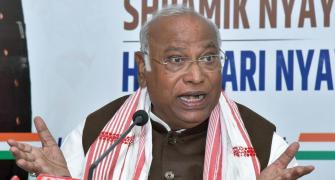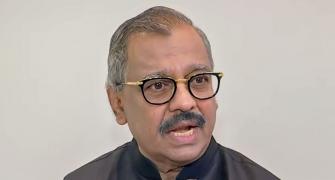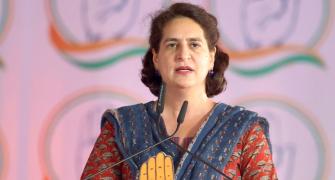It is by now well recognised that the biggest blow to the government-owned Employees' Provident Fund Organisation was delivered when, during Dr Manmohan Singh's tenure as finance minister, the Employees' Pension Scheme was started to give contributors a lifelong pension equal to half their last salary.
In 2001-02, barely six years after the scheme began, its deficit was reckoned at over Rs 17,000 crore (Rs 170 billion), and the figure has been growing at around Rs 3,000 crore (Rs 30 billion) each year, taking this year's deficit to probably around Rs 32,000 crore (Rs 320 billion).
While this was a serious problem, it was hoped once the government came up with the New Pension Scheme that would be privately (and better) managed by professional fund managers, more people would opt for retaining part of their savings in privately-run pension funds in preference to the government-run EPFO, and so the EPFO problem would at least get contained.
The problem is that while the new pension scheme has been delayed for more than two years now, the ministry of finance has just issued a notification that takes pension reforms in the opposite direction from that originally planned.
Right now, under the law, employers have to deduct provident fund (PF) contributions from the salaries of all employees earning under Rs 6,500 per month and make matching contributions and deposit the total collected with the EPFO -- companies that wish to run these Exempted Funds have to get the EPFO's permission, and are regularly inspected by the EPFO, which is then held responsible for any lapses on their part including siphoning off of funds, non-adherence to investment guidelines, and so on.
There is, in addition, another category of provident funds called Excluded Funds. These are provident funds run by companies for employees who earn more than Rs 6,500 a month -- by law, companies do not have to deduct/contribute to PF of such employees -- and are outside the purview of the EPFO. While such Excluded Funds have the same investment guidelines as the EPFO, the EPFO is not responsible for the losses made here.
What the finance ministry has now decreed is that such Excluded Funds also have to get recognised by the EPFO if they want to continue to get income tax concessions. While the government has tried to make light of the matter by saying, "The new condition only seeks to provide legislative synergy between the Income-Tax Act and the EPF & MP Act", it's obvious that once a fund is "recognized" by the EPFO, the EPFO will have to take full responsibility for it -- if this is not the case, why not just let all funds be registered with the income tax authorities in different parts of the country, as is the case today anyway?
Two issues arise out of this notification. One, under the Pension Fund Regulatory Development Authority (PFRDA) Act, all pension schemes other than the EPFO ones were to be regulated by the PFRDA since, ultimately, the EPFO's schemes were going to be competing with the ones offered by private players. Yet, what's been done is that the EPFO is being asked to regulate schemes offered by potential competitors!
The second problem is that no one knows just how many Excluded Funds there are in the country. One of the fund managers of a top private sector firm told me there are around 100,000 such funds while an organisation that works in the pension business puts the number at around 10,000!
Naturally, there is no clarity over what the corpus is with such funds that the EPFO now has to take responsibility for. The only thing that can be said with certainty is that the money is huge. To put this in perspective, there are 2,491 Exempted Funds in the country and another 367,895 Un-exempted Funds (these are the companies that deposit their PF contributions with the EPFO), but till 2003-04, the Exempted Funds had PF contributions of Rs 53,995 crore (Rs 539.95 billion) as compared to Rs 66,871 crore (Rs 668.71 billion) for the Un-exempted ones. Since Excluded Funds, by their very definition, are for those earning higher salaries, the monies in them will naturally be larger.
The question for the EPFO management is whether it wants to take on this huge potential liability. After all, if the corpus of the Excluded Funds is Rs 50,000 crore (Rs 500 billion), the EPFO is being asked to take additional responsibility of funds that are equal to a third of its existing portfolio.
If the corpus of the Excluded Funds is Rs 100,000 crore (Rs 1,000 billion), the additional responsibility is two-thirds of its existing portfolio.
Even on its existing portfolio, the EPFO is just about struggling to cope. It already has arrears of Rs 1,862 crore (Rs 1,862 billion) -- it has action pending against 45,000 companies for defaulting in payments or siphoning off funds, and this includes nearly 20,000 cases that are pending in courts and around 6,000 FIRs that are still pending (all this pertains to the period ending March 2004).
Add to this the burden of inspecting the Excluded Funds and the possible arrears there, and it looks possible this could be a killing blow.
All of this, it must be added, is based on the EPFO's somewhat dodgy accounts, and so could be much higher. One internal EPFO document, for instance, says that the fund had Rs 8,313 crore (Rs 83.13 billion) in the "interest suspense account" in 2002-03, of which Rs 2,360 crore (Rs 23.60 billion) was brought forward despite not being reconciled in appropriate accounts. In another case, while the EPFO balance sheet for 2002-03 said the payout during the year was Rs 5,506 crore (Rs 55.06 billion), the annual report said it was Rs 6,621 crore (Rs 66.21 billion)!
And you thought the Budget's intent was to further the EPFO's cause.
Do you want to discuss stock tips? Do you know a hot one? Join the Stock Market Discussion Group.








